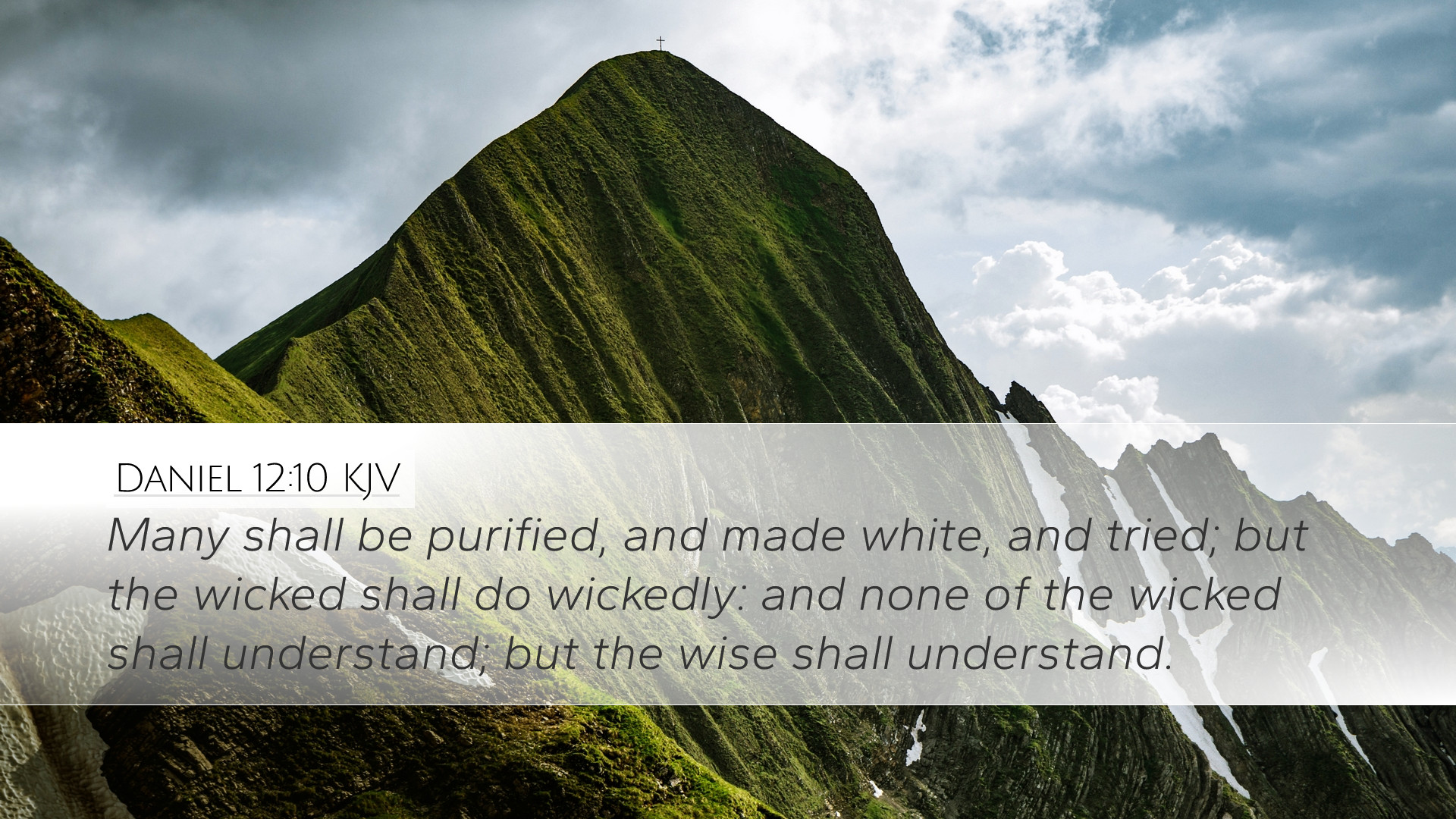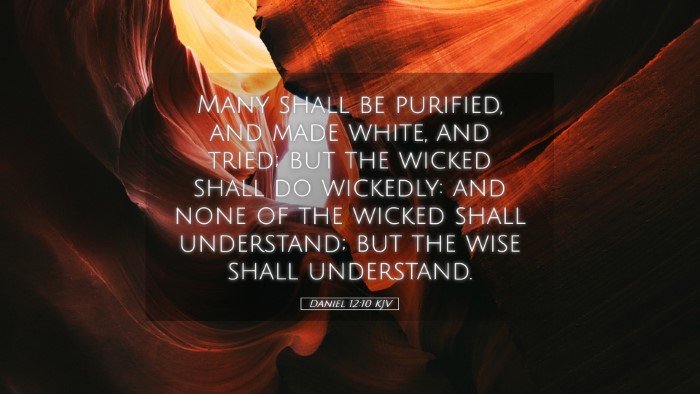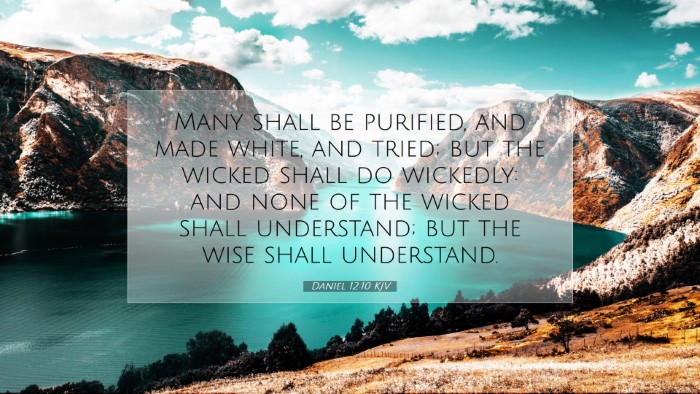Old Testament
Genesis Exodus Leviticus Numbers Deuteronomy Joshua Judges Ruth 1 Samuel 2 Samuel 1 Kings 2 Kings 1 Chronicles 2 Chronicles Ezra Nehemiah Esther Job Psalms Proverbs Ecclesiastes Song of Solomon Isaiah Jeremiah Lamentations Ezekiel Daniel Hosea Joel Amos Obadiah Jonah Micah Nahum Habakkuk Zephaniah Haggai Zechariah MalachiDaniel 12:10
Daniel 12:10 KJV
Many shall be purified, and made white, and tried; but the wicked shall do wickedly: and none of the wicked shall understand; but the wise shall understand.
Daniel 12:10 Bible Commentary
Commentary on Daniel 12:10
Verse Text: "Many shall be purified, and made white, and tried; but the wicked shall do wickedly: and none of the wicked shall understand; but the wise shall understand."
Introduction
The verse Daniel 12:10 serves as a profound conclusion to the prophecies given throughout the Book of Daniel. It encapsulates the themes of purification, wisdom, and the stark contrast between the righteous and the wicked. In this commentary, we draw insights from various public domain sources to illuminate its meaning and implications for believers across generations.
Expository Insights
Purification of the Righteous
Matthew Henry's Commentary
Matthew Henry emphasizes the process of purification and sanctification that the believers undergo. He notes, "The many that shall be purified represent the people of God, who are in the furnace of trial. Through various tribulations, they are made white, cleansed of sin, and prepared for their eternal destiny." Such purification indicates not just a mere external change but an internal transformation that aligns with God's holiness.
The Role of Trials
Albert Barnes
Albert Barnes reflects on the trials mentioned in the passage, stating, "Trials serve as a means for refining character, much like gold is purified by fire." He argues that these trials are essential for the maturation of faith, asserting that they test the qualities of believers, revealing authenticity and integrity. In the face of challenges, the faithful are called to rely on divine strength and wisdom for endurance.
The Nature of the Wicked
Adam Clarke’s Commentary
Adam Clarke highlights the fate of the wicked, noting, "The wicked shall do wickedly – their actions are not merely a product of circumstance but a reflection of their unrepentant hearts." He emphasizes that the persistence of the wicked in evil actions further distances them from understanding the truths of God. Their path is marked not by enlightenment but by moral blindness, underscoring their inevitable downfall.
The Dichotomy of Understanding
Wisdom Versus Ignorance
Matthew Henry
Henry appraises the contrast between the wise and the wicked. "The wise are those who endeavor to discern the meaning of God's word and providence." This understanding serves not only for personal edification but also equips believers to navigate the complexities of faith and moral dilemmas. The wise exhibit spiritual discernment, providing a robust foundation for righteous living amid confusion.
The Lack of Understanding Among the Wicked
Albert Barnes
Barnes complements Henry's assertions by articulating, "The wicked shall not understand; their ignorance is a judgment upon them, leaving them blind to the divine truths and implications of their actions." This lack of understanding isn't merely intellectual; it affects their moral choices, trapping them in a cycle of sin. True wisdom, as affirmed in Proverbs, begins with the fear of the Lord, which is absent in the hearts of the wicked.
Divine Sovereignty in Judgment
Adam Clarke
Clarke adds another layer to the discourse by citing divine sovereignty. He states, "God allows distinctions between the wise and the wicked to manifest in human experience." In His providence, those who reject truth face the consequences of their choices. This aligns with the broader theological view that suggests God’s justice will ultimately be revealed and fulfilled at the end of time.
Application for Today
Encouragement for Believers
The encouragement for believers is clear: amid trials, believers are reminded of the end goal—purification and wisdom through experience. These experiences refine faith and foster growth. Pastors and spiritual leaders should encourage their congregations to view trials as opportunities for deeper understanding and communion with God.
Warning for the Wicked
The stern warning against the wicked illuminates the spiritual peril of neglecting divine truth. There is a call to repentance and an invitation for those misled by sin to seek understanding and refuge in God’s mercy. Today's church must also be ardent in calling sin out while simultaneously offering hope and redemption through Christ.
Conclusion
Daniel 12:10 provides an insightful reflection on the state of humanity in response to God’s divine revelation. It serves as an imperative for spiritual vigilance, underscoring the transformative journey of believers and the grim reality for those who reject divine truth. As stewards of this message, pastors, students, theologians, and scholars must diligently seek to apply these truths in their studies and spiritual endeavors, fostering a community that acknowledges both the justice and mercy of God.


